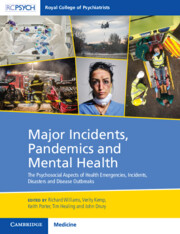 Major Incidents, Pandemics and Mental Health
Major Incidents, Pandemics and Mental Health from Section 5 - Sustaining and Caring for Staff During Emergencies
Published online by Cambridge University Press: 11 January 2024
This chapter explores the moral dimensions of work in emergency and pre-hospital medicine, with an emphasis on protecting the workforce and maintaining optimal functioning of teams. It explores the concepts of moral distress and moral injury from the literature and as they apply to emergency and pre-hospital medicine, but also in the light of the COVID-19 pandemic. It includes reference to the experience of one helicopter emergency medical service (HEMS) organisation attempting to make changes to its culture.
To save this book to your Kindle, first ensure no-reply@cambridge.org is added to your Approved Personal Document E-mail List under your Personal Document Settings on the Manage Your Content and Devices page of your Amazon account. Then enter the ‘name’ part of your Kindle email address below. Find out more about saving to your Kindle.
Note you can select to save to either the @free.kindle.com or @kindle.com variations. ‘@free.kindle.com’ emails are free but can only be saved to your device when it is connected to wi-fi. ‘@kindle.com’ emails can be delivered even when you are not connected to wi-fi, but note that service fees apply.
Find out more about the Kindle Personal Document Service.
To save content items to your account, please confirm that you agree to abide by our usage policies. If this is the first time you use this feature, you will be asked to authorise Cambridge Core to connect with your account. Find out more about saving content to Dropbox.
To save content items to your account, please confirm that you agree to abide by our usage policies. If this is the first time you use this feature, you will be asked to authorise Cambridge Core to connect with your account. Find out more about saving content to Google Drive.